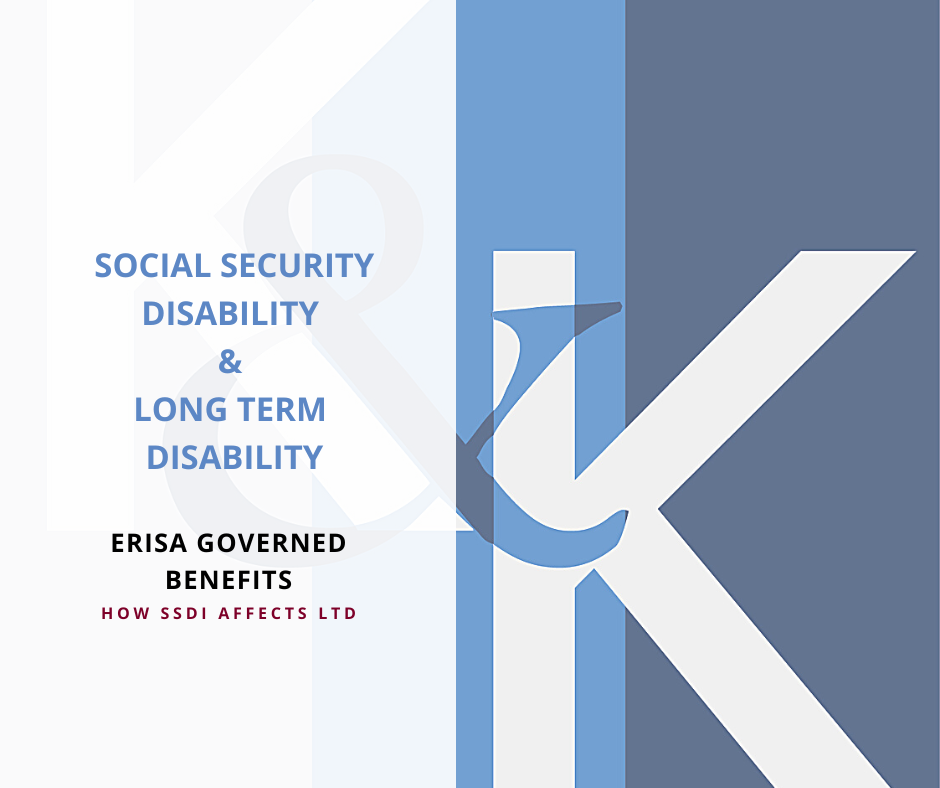
The Employee Retirement Income Security Act of 1974 (“ERISA”), 29 U.S.C. § 1001 et seq., was enacted to provide minimum standards for voluntarily established plans by employers in the private industry for the benefit of their employees. Despite its name, ERISA also applies to disability benefits an employee may be entitled to if s/he becomes unable to work due to a disability, whether or not it was work-related.
Social Security Disability Insurance (“SSDI”) benefits, in contrast, is a federal government program, and is available to most people, with certain exceptions, who have worked in any industry and contributed to the Social Security trust fund via the FICA tax.
Most ERISA plans encourage or even require, that an employee seeking long term disability (“LTD”) benefits also apply for SSDI because any amount paid by Social Security is an offset for the insurance company, making its payments substantially less.
However, being awarded SSDI benefits does not mean that the claimant will also qualify for LTD benefits because insurance companies are not bound by the Social Security Administration’s (“SSA”) determinations. Similarly, of course, the decision denying SSDI does not mean that the claimant will not qualify for LTD benefits under an ERISA plan. But an ERISA plan administrator is likely to use an SSDI denial as evidence that a claimant does not meet the ERISA plan’s definition of disability.
There are two principal differences between SSA and ERISA’s disability determinations.
- First, while a claimant has a very substantial burden to meet Social Security’s disability requirements (usually it is an inability to engage in any occupation, even minimum wage unskilled jobs), SSA approaches disability under the “whole person” standard, taking into account a person’s physical, as well as mental, impairments to determine work ability[1]. This can cause problems in the LTD disability determination because most policies set a limitation on disabilities based on a mental health impairment, limiting the payment of benefits to twenty-four, and sometimes even twelve, months.
- Second, ERISA also does not require plan administrators to accord special deference to the opinions of treating physicians[2], while SSA rules require that special (often controlling) weight be accorded to those opinions.[3]
Nevertheless, while Social Security disability awards do not bind plan administrators, they are evidence of disability.
Evidence of a Social Security award of disability benefits is of sufficient significance that failure to address it in the decision denying LTD benefits offers support that the plan administrator’s denial was arbitrary. Weighty evidence may ultimately be unpersuasive, but it cannot be ignored.[4]
The attorneys at Kantor & Kantor can help you navigate the world of disability insurance. If you have a denied claim for long term disability benefits, contact one of our knowledgeable ERISA attorneys today or use our online contact form.
[1] Bowen v. Yuckert, 482 U.S. 137 (1987).
[2] Black & Decker Disability Plan v. Nord, 538 U.S. 822 (2003), see also Jordan v. Northrop Grumman Corp. Welfare benefits Plan, 370 F.3d 869 (9th Cir. 2003).
[3] 20 CFR §§ 404.1527(d)(2), 416.927(d)(2).
[4] Salomaa v. Honda Long Term Disability Plan, 642 F.3d 666, 679 (9th Cir. 2011). See also Elliott v. Life Insurance Company of North America, Inc., 2019 WL 2970843 (N.D. Cal. Jul.9, 2019).

